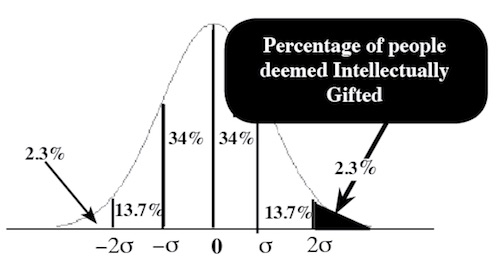
Since the beginning of recorded history, people have recognized that individuals differ in their ability to solve problems, deal with abstractions, and learn new ideas. We call this many-faceted ability intelligence. However, when it comes to defining this enigmatic trait, we face the famous Jainist conundrum in which three blind men grasp the tusk, trunk, and tail of an elephant and attempt to reconcile their different perceptions of this unfamiliar pachyderm.
We all have an intuitive perception of what we mean by “intelligence.” Those who see further than the rest of humanity–formulating complex theories, inventing new technologies, and making successful decisions–are seen to be highly intelligent. Those who have no interest in learning or find learning very difficult and whose lives are encumbered with a litany of self-defeating decisions, are usually perceived as unintelligent.
During more than a century of debate and discussion, cognitive psychologists have proposed a variety of definitions of intelligence and there remains a diversity of opinion. However, psychologist Linda Gottfredson advanced, in 1997, a definition that has achieved some consensus among members of the American Psychological Association (APA):
Intelligence is a very general mental capability that, among other things, involves the ability to reason, plan, solve problems, think abstractly, comprehend complex ideas, learn quickly, and learn from experience. It is not merely book-learning, a narrow academic skill, or test-taking smarts. Rather, it reflects a broader and deeper capability for comprehending our surroundings, “catching on,” “making sense” of things, or “figuring out” what to do.
For more information on intelligence and its measure, visit: What is intelligence? Is it measurable? – Intelligence and IQ
People who are highly intelligent are usually aware that they have different interests from most people and that they learn things in school more easily than the average. Whether they flaunt their intelligence depends upon a variety of factors. In many cases bright young people want social acceptance and will disguise their gifts to masquerade as “one of the group.” Other people of high intelligence will seek out others of high intelligence who share their interests. Although some people of high intelligence may put down others, they will often find that their arrogance brings unpleasant consequences. When Jeff Bezos called a fellow student “stupid”, he was knocked to the ground. Elon Musk’s giftedness prompted fellow students to hunt him down, and on one occasion hurled him down the stairs, breaking his nose.
Those who are slightly above average in intelligence are more likely to show arrogance. Those who are much more intelligent than average are not as concerned with those of lesser intelligence, as they are about those who may be more intelligent. The highly intelligent people will be competing with gifted people to achieve success in their fields.
